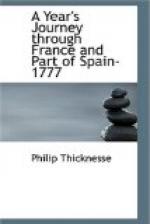The invalide guard at this fortress take upon themselves, very improperly, and I am sure very unwarrantably, to examine strangers who pass, with an impertinent curiosity; for they must admit all who come with a proper passa-porte into Spain, and durst not admit any without it. On my arrival at the Guard-house, they seized my horse’s head, and called for my passa-porte, in terms very unlike the usual politeness of French guards; and while my pass was carried into a little office, hard by, to be registered, those who remained on the side of my chaise took occasion to ask me of what country I was: I desired to refer them to my passa-porte, (where I knew no information of that kind was given,) as it was a question I could not very well answer; but upon being further urged, I at length told them, I was an Hottentot.—“Otentot—Otentot—pray what king governs that country?” said one of them. No king governs the Hottentots replied I. “What then, is your country without a king?” said another, with astonishment! No; not absolutely so, neither; for the Hottentots have a king; but he always keeps a number of ambitious and crafty men about his Court, who govern him; and those men, who are generally knaves, feed the people with guts, and entrails of beasts, give the king now and then a little bit of the main body, and divide the rest among themselves, their friends, their favourites, and sycophants. But I soon found, these were questions leading to a more important one; and that was, what countryman my horse was;—for, suspecting him to be an Englishman, they would perhaps, if I had been weak enough to have owned it, have made me pay a considerable duty for his admission into Spain; though I believe it cannot legally be done or levied upon any horse, French, or English, (to use an act of parliament phrase) but such “as are not actually in harness, nor drawing in a carriage.”
The Spaniards too have done their duty, as to the descent of the Pyrenees from Bellegarde, but no further; from thence to this village, is about the same distance that Boulon is from the foot of the mountains on the other side; but though this road is quite destitute of art it is adorned highly by nature.
But, before I left Bellegarde, I should have told you, that near that Fortress the arms of France and Spain, cut on stone pillars, are placed vis-a-vis on each side of the road; a spot where some times an affair of honour is decided by two men, who engage in personal combat; each standing in a different kingdom; and where, if one falls, the other need not run; for, by the Family Compact, it is agreed, not to give up deserters or murderers.
The road is not less romantic on the Spanish, than on the French side of the Pyrenees; the face of the country is more beautiful, and the faces of all things, animate and inanimate, are quite different; and one would be apt to think, that instead of having passed a few hills, one had passed over a large ocean: the hogs, for instance, which are all white on the French side, are all black on this.




